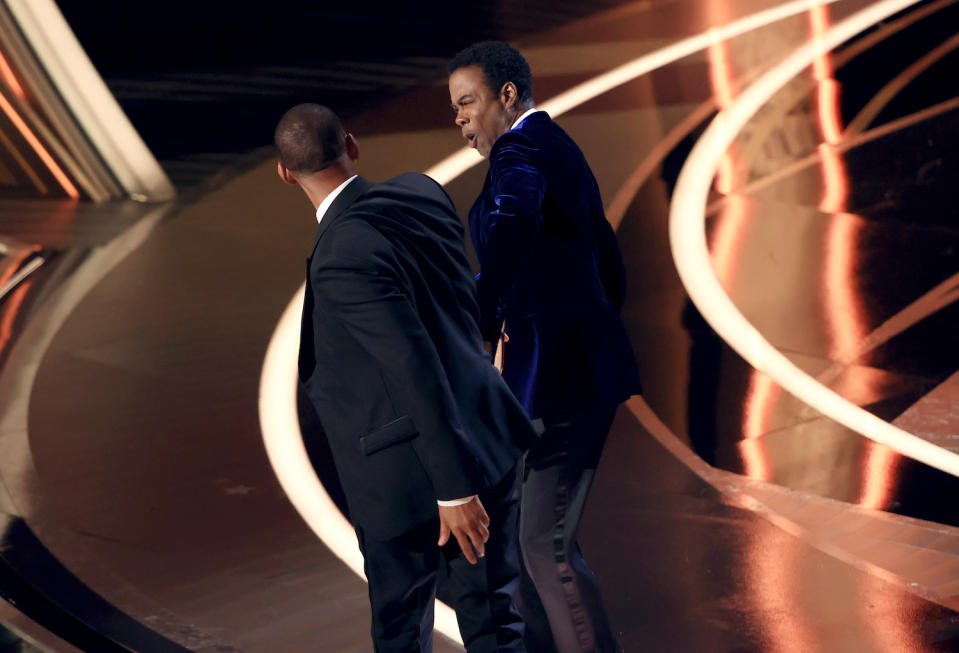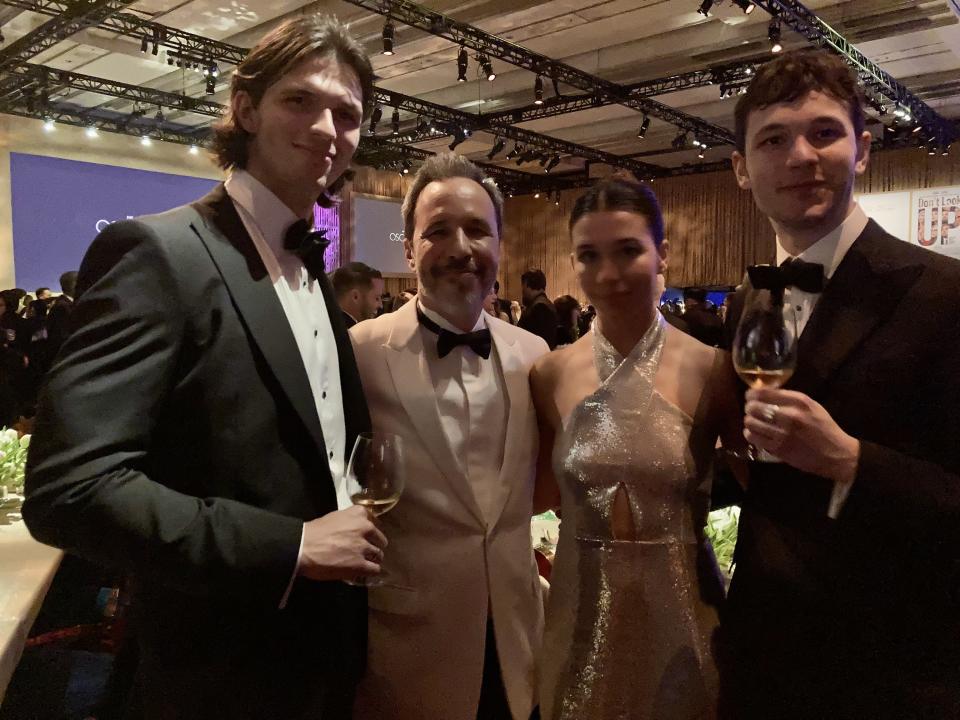Oscars Losers and Winners, from Will Smith to Sundance’s ‘CODA’ and ‘Summer of Soul’

- Oops!Something went wrong.Please try again later.
- Oops!Something went wrong.Please try again later.
- Oops!Something went wrong.Please try again later.
Walking the sunny red carpet into the Oscars Sunday afternoon, tested to the max and mask free, Hollywood was all smiles. Legendary chief Mary Parent and Warner Media executive Ann Sarnoff wondered just how many wins “Dune” would take home. (Six out of 10, the most of any movie.)
After a long and grueling off-and-on pandemic production in New Zealand, a grinding festival circuit, and an endless full-throttle awards campaign, producer Tanya Seghatchian and Netflix production executive Sean Berney wondered how many wins “The Power of the Dog” would actually land. (One out of 12.)
More from IndieWire
Michael Bay Thinks the Oscars Slap Is Overblown: Will Smith 'Is Not That Guy'
Amy Schumer 'Wasn't Allowed to Say' an Alec Baldwin Joke About 'Rust' Shooting During the Oscars
And since launching in virtual Sundance 2021, writer-director Sian Heder, her silver gown shimmering, crossed her fingers that “CODA” might win all three of its possible Oscars. It did, including Best Picture, the first for a streamer: AppleTV+.
Alas. None of these talking points grazed the top headline of Oscars 2022 as movie star Will Smith, on the verge of the apex of his career, slapped presenter Chris Rock. As the dust settles on the Oscar telecast amid tabloid headlines like “Will Smith: Best Smacktor,” let’s see who came out ahead and behind on Sunday night.
Losers
Will Smith: All went smoothly at the Oscars — until Smith rose from a socially distanced table to stride a few steps, ascend the stage, and smack presenter Rock across the face for dissing his wife Jada Pinkett-Smith for her lack of hair. (She has alopecia.) Did the Oscar writers vet this “G.I. Jane 2” joke? (No. It was an ad lib.) Back in his seat, Smith yelled, “Keep my wife’s name out of your fucking mouth.” And with that ugly exchange, the tenor of the night changed for the worse, for good.
What a waste of so much work invested in the movies and careers showcased on Hollywood’s big night. Not to mention the Academy Awards show itself as it tried to restore an audience after 2021’s pandemic plummet. The Oscar audience grew 58 percent from 2021, to 16.6 million viewers, which makes it the second-worst Oscar ratings ever.
The Academy is still picking up the pieces. Oscars’ decision makers didn’t agree to eject Smith from the Dolby Theatre before his Oscar win. A brief and noncommittal statement Sunday night — the Academy does not condone violence! — was followed Monday by a more strongly worded condemnation of Smith and a reminder of its own bylaws: “The Academy condemns the actions of Mr. Smith at last night’s show. We have officially started a formal review around the incident and will explore further action and consequences in accordance with our Bylaws, Standards of Conduct and California law.”
There were jeers for Smith when Smith accepted Best Actor post-slap, but cheers drowned them out. Smith turned his acceptance speech into a five-minute apologia in which he declared that he was called on to protect people, and be able to take abuse, and disrespect.
“I apologize to the Academy and my fellow nominees. … Art imitates life, I look like the crazy father.” He didn’t apologize to Rock until Monday, who declined to press charges. Millions of watchers around the globe are still sorting their feelings about a beloved movie star’s violent outburst, which hijacked the entire event.

Christopher Polk for Variety
The Oscars: Smith vs. Rock makes the memorable “Moonlight” Best Picture envelope moment look like a minor Oscar glitch. Sacheen Littlefeather accepting Marlon Brando’s “The Godfather” Oscar is a historical sidenote; the streaker behind David Niven a comedy bit. These moments are sticky and this one will haunt the Oscars forever.
The Academy’s stated mission is to promote movies; the organization’s goal is to present Hollywood in the best possible light, to uphold values of inclusion and honor excellence. For much of its storied history, the Academy’s Board of Governors mounted an Oscar show with Tiffany-level elegance and uplift. A ratings bump that correlated to people watching the trainwreck of Smith’s self-sabotaging career is not what anyone wanted.
Academy CEO Dawn Hudson was visibly distressed as she entered the Governors Ball, tripping over the threshold as she avoided questions. Academy Governor and documentarian Roger Ross Williams expressed his horror at the image of one Black man hitting another for the world to see. “It sends a terrible message,” he said. “It gives ammunition to people like Ted Cruz.”
With gloom surrounding the future of moviegoing and ABC’s high-luster Oscar show in existential crisis, many were praying that everything go right for once, from the beleaguered Academy decision-makers to rookie producer Will Packer, who packed the show (with help from Adam Blackstone) with rousing music from Beyoncé, Reba McEntire, and eventual Oscar-winner Billie Eilish, interspersed with comedy bits from his three hosts, Amy Schumer, Regina Hall, and Wanda Sykes. Post-slap, Schumer cracked: “Did I miss anything?”
The Oscars did not emerge from the challenge of how to coexist with the demands of a commercial partner network like ABC, which provides the hundreds of millions in revenue the Academy needs to operate. Packer’s Oscar show, with or without Smith’s meltdown, was a roller-coaster ride of ups and downs, questionable choices, and brilliant musicianship and stagecraft.
The show moved well, but Packer made rookie mistakes as he tried to keep everyone happy. The running time shot over the three-hour mark by 39 minutes. The In Memoriam section confused viewers; Sykes’ tour of the Academy Museum was a turn-off; the Twitter fan sections meant nothing; the Bond sizzle reel fell flat; a frail Liza Minnelli made everyone feel worse; and the show didn’t milk its live “Godfather” moment for full emotional effect.
The “Pulp Fiction” and “White Men Can’t Jump” reunions worked better than the one for “Juno,” the action-sports presenters were charming, and movie star Kevin Costner held the room with a mesmerizing tribute to movies. Every time someone tries to learn the Oscar ropes, they run away in terror of ever repeating the experience. Where is the Oscars’ Gil Cates when we need him? The late great producer delivered smooth Oscar shows 14 times, learning more from each go-round. Finally, Packer tweeted: “Welp…I said it wouldn’t be boring.”
At the Governors Ball, Oscar nominee and Academy directors branch governor Steven Spielberg opted not to answer the question of whether the eight categories pre-recorded in the hour before the show were blended effectively into the telecast. He’s waiting to argue his case about including them in the ceremony at the next Governors board meeting. (Held on Zoom, 53 people join these calls now.) If president David Rubin had taken the eight-category pre-show to a Board of Governors vote, he would have been turned down. Many question whether the organization is simply too unwieldy to self-govern and put on a decent Oscar show.

Anne Thompson
Netflix: The mighty streamer’s canny awards team expended considerable resources to keep “The Power of the Dog” in frontrunner status for as long as it did. Co-CEO Ted Sarandos and his team looked downcast as they filed into the Governors Ball. All that time and energy for naught, as AppleTV+ took streamer bragging rights for the first Best Picture win. But all the billboards and panels in the world couldn’t convince mainstream voters to care for an art film that challenged and confused them. Netflix has been down this road before, with “Roma,” “The Irishman” and “Mank,” and they’ll be back.
White-haired Jane Campion was happy with her Best Director win, the third woman to take the prize after Kathryn Bigelow and Chloé Zhao. She’s the only woman director to be nominated twice. After her Critics Choice Awards gaffe about the Williams sisters, she learned the hard way to never improvise a public speech and carefully read her remarks from a prepared text. At the Governors Ball, slowly but surely, Paolo Sorrentino, Benedict Cumberbatch, Kodi Smit-McPhee, and more joined her on the crowded dance floor and lost themselves to the pulsing beat. Tomorrow is another day.
Winners
Denis Villeneuve beamed proudly with his children at the Governors Ball, grateful that his carefully wrought space epic, “Dune,” dominated the awards haul., much as craft-friendly “Mad Max: Fury Road” did in 2016. While he never took the stage and was denied a nomination for Best Director, his nominated craftspeople, who started accepting their awards at the pre-show starting at 4 p.m. PT (to a full Dolby Theatre), agreed to take the high road and not tarnish their wins with rancor over the eight categories relegated to second-tier status.
They all thanked the French-Canadian auteur, and decided to save their fight for after the Oscars, including Best Editor winner Joe Walker, who reminded me that the five circles on the base of the Oscar statue refer to the original Academy’s five branches: actors, writers, directors, producers, and technicians.
Legendary and Warner Bros./HBO Max were ecstatic with the six “Dune” wins, but the one “King Richard” Oscar was tarnished for everyone, from the horrified Williams sisters (who opened the show with their backs to the Dolby Theatre to introduce Beyoncé’s pre-recorded lime-green Compton production number “Be Alive”) and downcast producers Tim and Trevor White, who shepherded the project through development and production and should have been celebrating their Best Actor victory, to director Reinaldo Marcus Green, who Smith forgot to thank in his self-justifying acceptance speech.

Anne Thompson
Disney executives Peter Rice and Jennifer Lee (with husband Alfred Molina) were all smiles as Disney took home six Oscars, including Best Animated Feature “Encanto,” which boasted not one but two Lin-Manuel Miranda songs performed beautifully on the telecast (nominated “Dos Oruguitas” and Billboard smash “We Don’t Talk About Bruno”), plus two Searchlight wins for “The Eyes of Tammy Faye” plus their hit with Hulu, Ahmir “Questlove” Thompson‘s 1969 concert documentary “Summer of Soul,” also launched at Sundance 2021. At the Governors Ball, “Summer of Soul” producer David Dinerstein clutched his Oscar, trying to enjoy his moment.
But the truth was, Oscar attendees were looking at videos on their cell phones, not the rookie documentarian’s moving Oscar acceptance speech. (See Thompson tell Jimmy Fallon about his big night here.) Miranda missed the Oscars to stay home with his wife with Covid; his directorial debut “Tick, Tick, Boom” also landed two Oscar nods, as he moves on to more success. He’ll land his EGOT one day.
Sian Heder took home Adapted Screenplay and celebrated three big Oscars for “CODA” Sunday with the first deaf Supporting Actor winner Troy Kotsur, who praised her as “the best communicator, who brought the deaf and hearing world together. You are a Sian Heder bridge.” News space that would have been filled by the story of the little engine that could winning Best Picture was co-opted by Smith vs. Rock. Nonetheless, Heder is already a hot commodity with more film and television work than she knows how to execute, which is why she thanked her husband for making it possible for a mother of two children to direct movies at all.

Gilbert Flores for Variety
AppleTV+: The streamer plunked down $25 million at Sundance 2021 for a small drama about a resilient deaf family that buyers recognized could be Oscar gold. Theatrical distributors couldn’t step up to that number, not during a pandemic when theaters were closed, producer Philippe Rousselet told me. And so the men running Apple film content — Jamie Erlicht, Zack Van Amburg, and Matt Dentler — made the acquisition, with a commitment to an awards campaign that was planned for before the movie hit Apple in August.
AppleTV+ followed through on that promise, which yielded the first-ever Best Picture win for a streamer. Apple’s marketing team led by Rita Cooper Lee brought in a village of canny Oscar campaigners, from Terry Curtin to Strategy PR — and screened the hell out of the movie, which became a must-see after its big SAG wins for Ensemble and Kotsur. With its BAFTA and WGA Adapted Screenplay and PGA wins, “CODA” was the fresh horse that came from behind to overtake the flagging frontrunner, “The Power of the Dog.” Momentum and timing are everything at the Oscars, but so is capturing the zeitgeist. Pandemic-battered Oscar voters wanted a movie that touched their hearts. They admired “The Power of the Dog” for its craftsmanship, but “CODA” made them cry.
No movie wins Best Picture without capturing the mainstream voters in the Academy. Although it’s rare to win Best Picture without craft support, another family drama, “Ordinary People,” did win four Oscars including Best Picture without it. But the “CODA” win is the first time since “Grand Hotel” in 1932 that a movie has won Best Picture without director or editing nods. (“Grand Hotel” only had the one nomination.) Four other films have won Best Picture without a Best Director nomination (“Driving Miss Daisy,” “Argo,” and “Green Book”), and one-take wonder “Birdman” took Best Picture without editing.

Gilbert Flores for Variety
For Jessica Chastain, three times was the charm as she finally won an Oscar for “The Eyes of Tammy Faye,” along with her hair and makeup team, giving the model Oscar acceptance speech, adding her character Tammy Faye’s compassion and empathy to her hopes for a better and more inclusive world for people who feel isolated and alone, especially the LGBTQ community. “We desire to be accepted for who we are,” she said, “and who we love, and to live a life without fear of violence and terror.”
Ariana DeBose: The Broadway chorine turned “West Side Story” breakout movie star became the first Afro-Latina and openly queer woman to win the Oscar and followed Supporting Actress winner Rita Moreno in the same role. “Dreams do come true,” DeBose said. “There is indeed a place for us.” She is now making the transition away from musicals into other genres, starring as voodoo priestess Calypso in Sony/Marvel’s “Kraven the Hunter” (January 13, 2023), and looking for the next perfect role, she told me at the Governors Ball.
Kenneth Branagh is now the Oscar-winning screenwriter of “Belfast,” after eight nominations. His perfect mix of personal and accessible persevered in a close race against popular comedies from auteurs Paul Thomas Anderson (“Licorice Pizza”) and Adam McKay (“Don’t Look Up”), who took home nothing. Branagh put on a major charm offensive throughout Oscar season until he and nominee Ciarán Hinds caught COVID at the BAFTAs and were put on hold until they cleared safety protocols. Branagh will be able to demand more from the movies he makes from now on, and hopefully will use this win to push against the constraints of commercial Hollywood. And Focus Features executive Peter Kujawski and his team were relieved, after spending heavily, to land the one win.
Ryusuke Hamaguchi can also call his own shots, in Japan or anywhere else, after delivering “Drive My Car” (Janus Films), a compelling three-hour treatise on grief, connection, and Chekhov that earned four Oscar nominations and one win. It marked the first Japanese film to score a Best Picture nomination, the fifth Oscar for Japan, and the second Japanese Best International Feature win. In his graceful acceptance speech, Hamaguchi suggested that the world responded during a pandemic to this Murakami story about loss.
What many Oscar lovers are mourning is the show they once adored, a show that celebrated movies with flair and finesse. There’s a place to celebrate movies, somewhere.
Best of IndieWire
Sign up for Indiewire's Newsletter. For the latest news, follow us on Facebook, Twitter, and Instagram.

